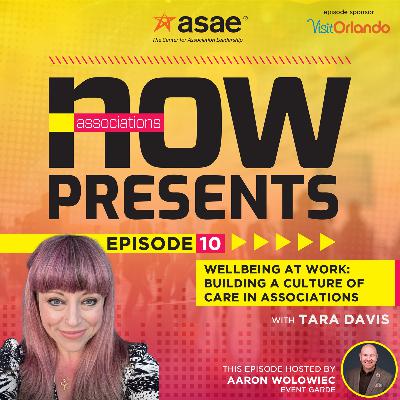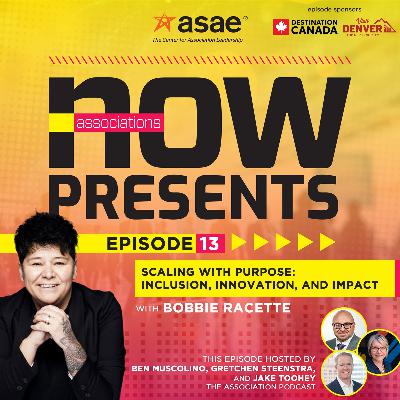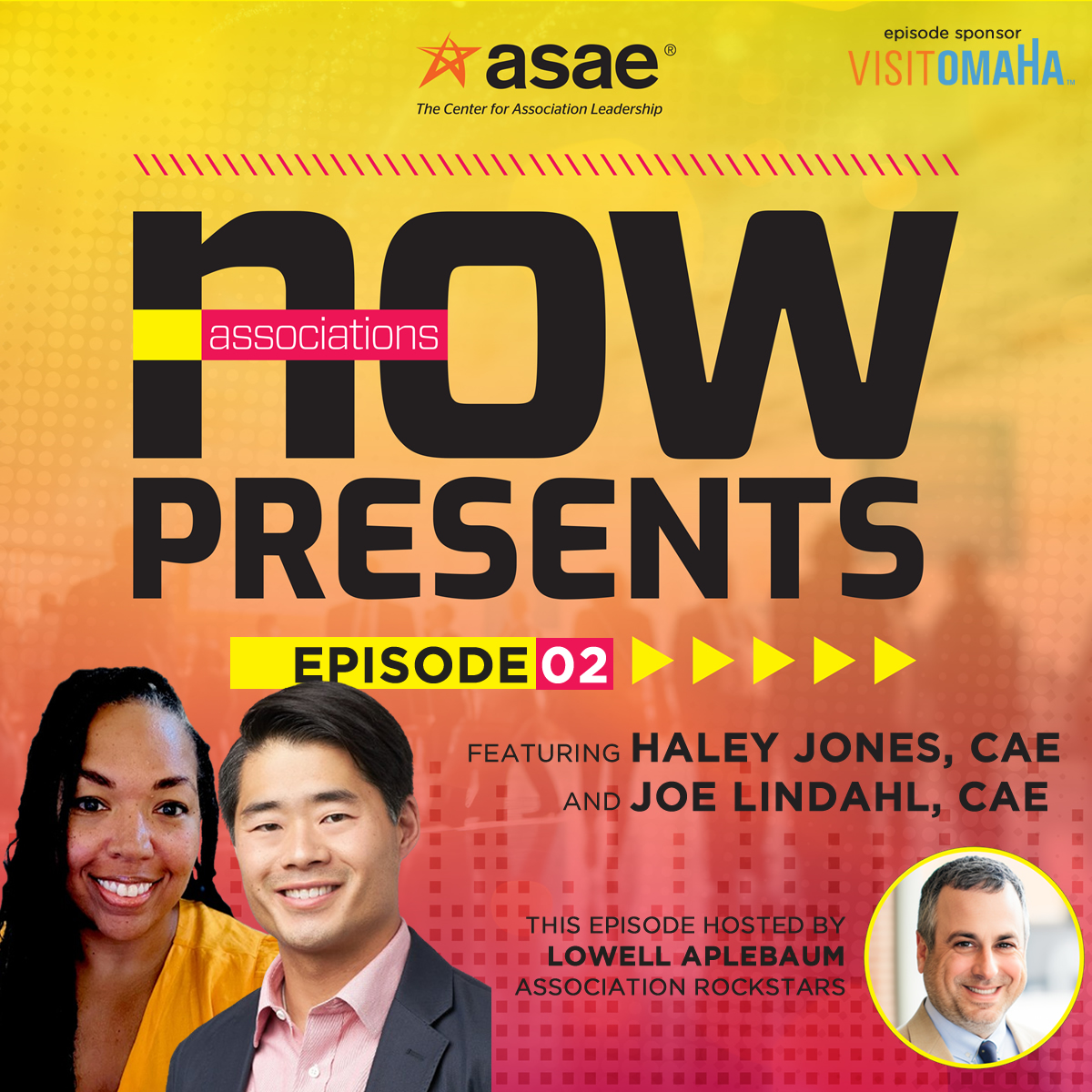Wellbeing at Work: Building a Culture of Care in Associations
Description
In this episode of Associations NOW Presents, guest host Aaron Wolowiec, FASAE, CAE, CMP Fellow, founder and president of Event Garde and host of the Voices & Views podcast, chats with Tara Davis, senior director, internal communications and staff wellbeing at the American Psychological Association, about the growing importance of wellness in high-stress industries like associations and hospitality. Tara shares how APA is fostering a culture of care through initiatives like the "Meet with Purpose" campaign, and discusses key strategies for preventing burnout, supporting mental health, and building intentional connections among staff. This insightful conversation explores emerging wellness trends and how prioritizing employee wellbeing can drive both personal and organizational success.
Check out the video podcast here:
This episode is sponsored by Visit Orlando.
Associations NOW Presents is produced by Association Briefings.
Transcript
Aaron Wolowiec: [00:00:00 ] Hello, and welcome to this month's episode of Associations Now Presents. We'd like to extend a special thank you to this episode sponsor. Visit Orlando. I am Erin Wallic, founder and president of Event Card, where we're passionate about transforming to help organizations meet, learn, plan, and grow. I'm also honored to be a newly inducted member of the 2025 Class of A SAE Fellows, an incredible community of change makers and thought leaders in the association space at Event Guard.
We're known for helping associations elevate their meetings and learning experiences, reimagine facilitation practices, and navigate meaningful strategic planning. But today, I'm here not just as a. Facilitator or strategist, but as the founder of Healthy By Association, a wellness focused community, I launched back in 2017 to support those of us working in the often high stress world of associations and hospitality.
That's why this conversation is especially close to my heart. Today's [00:01:00 ] episode takes a deep dive into what wellness really looks like in association life beyond the buzzwords. We're talking about burnout, prevention, mental health, flexible work, and what it means to build a culture of care that supports both staff and members.
Joining me is someone who lives and breathes this work. Tara Davis, senior Director of Internal Communications and Staff Wellbeing at the American Psychological Association. Tara brings more than 15 years of experience in using psychological science and strategic communication to build healthier, more human centered workplaces.
Her work sits at the intersection of empathy. Evidence and action, and I can't wait for you to hear her insights, whether you're a CEO, trying to prevent staff burnout, an events professional considering wellness lounges and quiet rooms, or just an overwhelmed association pro Wondering if it's okay to take a real lunch break.
This episode is for you. Alright, let's get into it. Welcome again, Tara. We're gonna certainly start the conversation today from a big picture [00:02:00 ] perspective, and I would love to just define a key term before we get into it. When you think about wellness, I'm curious, what does wellness mean to you within the context of association life today?
Tara Davis: First of all, thank you so much for inviting me to be here. I am so excited about this opportunity and to talk about something I'm very passionate about. So thank you. So I like to focus on the term wellbeing rather than wellness. It seems a little bit of a wordsmithing, but. Wellness to me implies either you're well or you're not.
And it is like one end of the spectrum or the other. And in reality, wellbeing is a spectrum, right? And it's a state of being healthy and happy. And there are lots of different types of wellbeing. There's financial, there's social, there's intellectual, and I think that. It's important to focus on this holistic wellbeing.
It used to be [00:03:00 ] that people thought about it really as just your physical health, and then I think we evolved a little bit to consider your mental health, but it's so much more. It's this connection of your mind and your body and how you really are doing. When someone asks you.
Aaron Wolowiec: I love that there are so many different dimensions of wellbeing and they don't always get talked about in all of the places at home or in the workplace, in school, in our church, or volunteer opportunities either.
I'm curious. How you think expectations around workplace wellbeing have changed for association professionals over the last few years? Has it been just as a result of the pandemic or have other factors really been at play?
Tara Davis: That's such a good question and so perfect. 'cause my dog is barking, so if you hear that, I apologize.
That is a symptom of this work life just coming mixed together and not being suffered anymore. But yeah, I [00:04:00 ] think that some organizations were thinking about wellbeing in the workplace long before it was trendy, and I feel very lucky to be in an organization like that. APA, the American Psychological Association has had an office.
Dedicated to employee wellbeing since I think 2003 and being a leading mental health organization. That makes sense, right? You can't expect to be talking about mental health in society and with other organizations, and so in my mind, you can't really separate wellbeing from workplace initiatives and from deadlines and priorities.
All of that is intertwined with that. Isn't always the case. And I think one, I don't think you can really say a silver lining of the pandemic. One result of the pandemic that is positive is that more employers have been paying attention to mental health in the workplace because I think there was such a decline in the mental health of our country.
We really facing a mental health. [00:05:00 ] epidemic as well. The other thing is not only is it about organizations paying attention, but also employees started expecting it. So it's no longer this nice to have, oh, I'm a feel good company 'cause I care about my employees. It's now a business imperative and I think that less people are having to prove the business case to their employers.
And I've also noticed that a lot of these initiatives used to exist solely in HR and it maybe it was a tiny part of an HR employee's job, but now there are positions and teams dedicated to it in my situation, and I think that's a really beautiful thing, showing the priority and the importance that it really is for our organizations and employees' success.
Aaron Wolowiec: And I want people who are listening today to not immediately get turned off by thinking, oh, we're not as large as, we don't have a department dedicated to health and wellbeing like [00:06:00 ] APA does. Certainly throughout the episode today, we're gonna be talking about different ways to come at health and wellness, no matter your size, whether really you're a.
Solopreneur working as a consultant within the industry, or maybe a small staff or medium staff, or a large staff organization. So before we get into those tips and tricks, let's start with fundamentally, what are some of the key elements of a workplace culture that truly prioritizes while being no matter the size of the organization?
Tara Davis: I love that question because yes, we do have an office dedicated, and so in terms of resources and budget, but it's really only two of us, two and a half I should say, as I have a member of my team who support some other work in the organization. Don't think that we have 20 folks dedicated to this.
We have about 550 employees and there are two and a half of us who are really focused on creating a healthy workplace. And so in addition to that, I wanna quickly. Note something that is part of what you're already doing, that you can [00:07:00 ] just think about differently or message differently, or your intention can be a bit different or it's free.
Just wanna quickly say that. So have no fear, don't worry. We don't have a large budget or even a large team. So back to what are these key elements? This is something I've been doing for a while and there are different models that have come around of. What it really looks like to prioritize wellbeing in the workplace.
And what I love is our former surgeon general, Dr. Vik Murthy, came up with a framework for mental health and wellbeing in the workplace. And some psychologists from a PA actually co-created this with the surgeon general's office, so you can look it up if you just Google a surgeon general model for wellbeing, it'll come up and it has these.
Five dimensions of things that the research has shown. These things lead to a healthy workplace. If you focus on these things, you have the outcomes that you're looking for in terms [00:08:00 ] of your people and your organization. So one is. Connection and community, and we know that loneliness is rampant right now, and we also know that it's really important for our mental health and wellbeing to be connected to others connection and community.
What I love about this model is each of these things are rooted in. Human needs, two, human needs for each dimension. And these needs are consistent across demographics, across type of work, job level, all of these things. And so first is connection and community. So it's rooted in the need for social support and belonging, which is very important right now.
Belonging is very important in the workplace. And the next one is protection from harm. And that's rooted in the need for. Safety and security. So we mean physical safety, of course. We





















